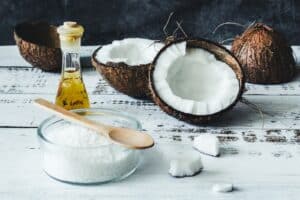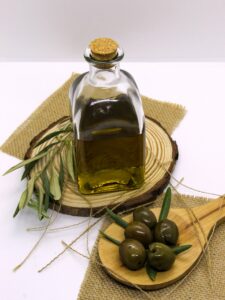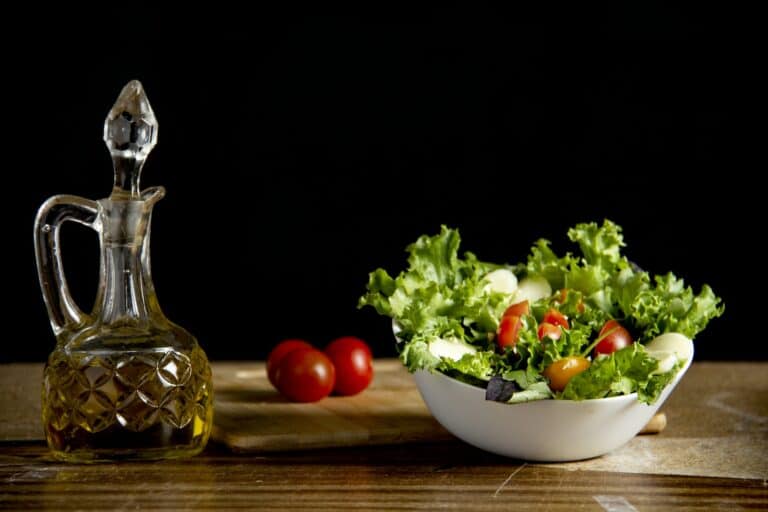When it comes to cooking and crafting healthy, flavorful salads, the choice of oil you use can make a world of difference. Oils not only affect the taste of your dishes but also play a crucial role in determining their nutritional value. In this in-depth guide, we’ll explore the healthiest oils for cooking and dressing your greens, delving into their unique characteristics, benefits, and best uses. We’ll also discuss which oils to avoid and why, so you can make informed choices in your culinary journey.
Understanding Different Types of Cooking Oils

Before we dive into specific oils, let’s start by understanding the various categories of cooking oils available:
Vegetable Oils
- These oils are often derived from a combination of plant sources like soybeans, corn, or canola.
- They are versatile and commonly used in cooking and baking.
Nut Oils
- Nut oils, like walnut and almond oil, have distinct flavors that can enhance your dishes.
- They are rich in healthy monounsaturated fats.
Seed Oils
- Oils extracted from seeds, such as sunflower and flaxseed oil, are known for their unique nutrient profiles.
- They are typically high in polyunsaturated fats.
Coconut Oil
- Derived from coconut flesh, this oil has gained popularity for its potential health benefits and unique flavor.
- It contains medium-chain fatty acids.
Now that we have an overview of the different types of oils let’s explore the healthiest options for cooking and salad dressings.
The Healthiest Oils for Cooking and Dressing Your Greens
Healthiest Oils for Cooking

1. Extra Virgin Olive Oil
Extra virgin olive oil is a staple in Mediterranean cuisine and renowned for its robust flavor and numerous health benefits. It’s an excellent choice for cooking due to its high smoke point, which means it can withstand higher temperatures without breaking down and producing harmful compounds.
Expert tip: Use extra virgin olive oil for sautéing vegetables or drizzling over grilled meats for a delightful flavor.
2. Avocado Oil
Avocado oil is prized for its mild, buttery taste and high smoke point, making it ideal for various cooking methods, including frying and roasting. It’s also packed with heart-healthy monounsaturated fats.
Expert tip: Try avocado oil for making crispy roasted vegetables or as a base for homemade salad dressings.
3. Grapeseed Oil
Grapeseed oil is a versatile option with a neutral flavor and a high smoke point. Its light taste won’t overpower your dishes, making it perfect for stir-frying and baking.
Expert tip: Use grapeseed oil when preparing Asian-inspired stir-fry dishes for a subtle, clean taste.
4. Coconut Oil
Coconut oil has gained popularity for its potential health benefits, including medium-chain fatty acids that may aid in weight management. It’s suitable for high-heat cooking, but be sure to use it sparingly due to its saturated fat content.
Expert tip: Use virgin coconut oil for a tropical twist in your baking and high-heat cooking endeavors.
Healthiest Oils for Salad Dressings

1. Olive Oil
Olive oil is a classic choice for salad dressings, thanks to its rich, fruity flavor. It’s also a cornerstone of the Mediterranean diet, known for its heart-healthy monounsaturated fats and antioxidant properties.
Expert tip: Combine olive oil with balsamic vinegar and a pinch of salt and pepper for a simple yet delicious salad dressing.
2. Flaxseed Oil
Flaxseed oil is prized for its omega-3 fatty acids, which are beneficial for heart health. It has a nutty flavor that pairs well with leafy greens and other salad ingredients.
Expert tip: Drizzle flaxseed oil over your salad to boost its omega-3 content and add a delightful nutty taste.
3. Walnut Oil
Walnut oil is another excellent choice for salad dressings due to its distinct, nutty flavor. It’s rich in polyunsaturated fats, including alpha-linolenic acid (ALA), an essential omega-3 fatty acid.
Expert tip: Combine walnut oil with honey and Dijon mustard for a delectable vinaigrette.
Cooking Oils to Avoid

While we’ve explored some of the healthiest options, it’s equally important to be aware of oils to avoid or use sparingly. These include:
1. Canola Oil
Canola oil, though popular, is often refined and processed using chemical solvents. It may contain trans fats and is best used in moderation.
2. Palm Oil
Palm oil is commonly found in processed foods and is known for its high saturated fat content. It’s best to limit your consumption of products containing palm oil.
3. Soybean Oil
Soybean oil is high in saturated fat and may not be the best choice for heart health. It’s often used in commercial food products, so be mindful of its presence in packaged foods.
Storing Oils for Maximum Freshness

To ensure your cooking and salad oils maintain their quality and health benefits, follow these storage tips:
- Keep oils in a cool, dark place away from direct sunlight.
- Seal the containers tightly to prevent oxidation and rancidity.
- Check the expiration date and use oils within their recommended shelf life.
A Few More Healthy Oils to Consider
1. Sesame Oil
Sesame oil comes in two main varieties: regular and toasted. Regular sesame oil has a light, nutty flavor, while toasted sesame oil offers a richer, smoky taste. Both are rich in unsaturated fats and can be used for stir-frying or as a finishing touch for Asian-inspired dishes.
Expert tip: Use toasted sesame oil sparingly as a flavor enhancer; a little goes a long way.
2. Sunflower Oil
Sunflower oil is known for its neutral taste and high content of polyunsaturated fats, making it a heart-healthy choice for cooking. It has a relatively high smoke point, making it suitable for various culinary applications.
Expert tip: Sunflower oil works well for baking and sautéing, offering a light and clean flavor to your dishes.
3. Safflower Oil
Safflower oil is another option rich in polyunsaturated fats, particularly linoleic acid. It has a relatively low smoke point compared to some other oils, so it’s best used for low to medium-heat cooking and salad dressings.
Expert tip: Combine safflower oil with lemon juice, garlic, and herbs for a delightful salad dressing.
The Importance of Smoke Points in Cooking
The smoke point of an oil is a critical factor to consider when choosing the right oil for your cooking needs. It refers to the temperature at which an oil begins to smoke and break down, releasing harmful compounds and altering the flavor of your food.
- Oils with high smoke points, such as avocado and grapeseed oil, are suitable for high-heat cooking methods like frying and searing.
- Oils with low smoke points, like flaxseed and walnut oil, are better for gentle cooking techniques like sautéing and salad dressings.
Understanding smoke points is essential for preventing the degradation of oil and ensuring that your dishes retain their intended flavors and health benefits.
The Role of Fatty Acids in Cooking Oils
The composition of fatty acids in cooking oils plays a significant role in their health impact and culinary versatility:
- Saturated Fats: Oils high in saturated fats, like coconut and palm oil, can contribute to elevated levels of LDL (bad) cholesterol and may increase the risk of heart disease when consumed excessively.
- Monounsaturated Fats: Oils rich in monounsaturated fats, such as olive and avocado oil, have been associated with heart-healthy benefits, including improved cholesterol levels and reduced inflammation.
- Polyunsaturated Fats: Oils like sunflower and safflower oil are high in polyunsaturated fats, particularly omega-6 fatty acids. While these fats are essential, an excessive intake of omega-6s relative to omega-3s can lead to an imbalance, potentially contributing to inflammation.
- Alpha-Linolenic Acid: Found in flaxseed oil, alpha-linolenic acid (ALA) is an essential omega-3 fatty acid that supports heart health and reduces inflammation.
- Oleic Acid: Olive oil is renowned for its high oleic acid content, which contributes to its monounsaturated fat profile and potential health benefits.
Balancing your intake of these fatty acids can be a key aspect of maintaining a healthy diet. Opting for oils with a favorable fatty acid composition can promote cardiovascular health and overall well-being.
Exploring Other Oils and Their Unique Benefits
1. Chia Seed Oil
Chia seed oil is a relatively lesser-known option but packs a punch when it comes to nutritional value. It’s exceptionally high in omega-3 fatty acids, making it a great addition to your diet for heart health.
Expert tip: Use chia seed oil in smoothie recipes or as a drizzle over yogurt and granola for a boost of omega-3s.
2. Canola Oil (In Moderation)
While canola oil has faced criticism for its processing methods, it contains a balanced fatty acid composition, including both monounsaturated and polyunsaturated fats. When used in moderation and as part of a balanced diet, it can be a reasonable choice for cooking.
Expert tip: Use canola oil for baking and pan-frying, but be mindful of its processing and consume it in moderation.
The Omega-3 Fatty Acid Connection
Omega-3 fatty acids, primarily found in fatty fish like salmon and flaxseed oil, have garnered attention for their potential health benefits. These essential fats play a crucial role in reducing inflammation, improving blood sugar control, and reducing the risk of heart disease.
Incorporating omega-3-rich oils like flaxseed oil into your diet can contribute to these positive effects. However, it’s important to maintain a balanced intake of omega-3s and omega-6s to support overall health.
The Mediterranean Diet and Olive Oil
One of the most celebrated and researched dietary patterns is the Mediterranean diet, which emphasizes whole foods, lean proteins, and, of course, olive oil. This diet has been associated with numerous health benefits, including reduced risk of heart disease and improved longevity.
Key Components of the Mediterranean Diet:
- Olive Oil: Olive oil is a central component of this diet, used in cooking and as a primary source of healthy fats. Its high content of monounsaturated fats, primarily oleic acid, is believed to contribute to its heart-protective properties.
- Fruits and Vegetables: A wide variety of colorful fruits and vegetables provide essential vitamins, minerals, and antioxidants.
- Whole Grains: Whole grains like whole wheat, brown rice, and oats are rich in fiber, promoting digestive health.
- Lean Proteins: Fish, poultry, legumes, and nuts are preferred protein sources, offering essential nutrients while keeping saturated fat intake low.
- Moderate Wine Consumption: In some Mediterranean countries, moderate red wine consumption is part of the diet, potentially contributing to its cardiovascular benefits.
Adopting a Mediterranean-style eating pattern can be a flavorful and heart-healthy choice. It emphasizes the use of extra virgin olive oil in cooking and as a salad dressing, infusing dishes with its distinctive taste and health benefits.
Coconut Oil and Its Controversy
Coconut oil has garnered both praise and criticism in recent years. It is a staple in tropical cuisines and has a unique, sweet aroma and flavor. However, its high saturated fat content has sparked debates about its impact on heart health.
The Coconut Oil Controversy:
- Saturated Fat Content: Coconut oil is primarily composed of saturated fats, which were previously thought to be detrimental to heart health due to their potential to raise LDL (bad) cholesterol levels.
- Medium-Chain Fatty Acids: Some proponents of coconut oil argue that its specific type of saturated fats, known as medium-chain triglycerides (MCTs), may have unique health benefits, such as aiding in weight management and providing a quick source of energy.
- Moderation is Key: While coconut oil can be part of a balanced diet, it’s essential to use it in moderation. It can be an excellent choice for certain cooking methods and adding a tropical twist to dishes.
Ultimately, the relationship between coconut oil and health is complex, and more research is needed to fully understand its impact. If you enjoy its flavor and aroma, feel free to use it occasionally, but remember to balance it with other healthier oils in your diet.
Final Thoughts – The Healthiest Oils for Cooking and Dressing Your Greens
Incorporating the right oils into your cooking and salad dressings can elevate your culinary creations while providing essential nutrients. Opt for oils like extra virgin olive oil, avocado oil, and walnut oil for a delicious and nutritious experience. Be cautious of less healthy options, and always prioritize oils that align with your dietary and health goals.
Remember, the healthiest cooking oils not only enhance the flavor of your dishes but also contribute to a heart-healthy and satisfying diet. By making informed choices, you can savor every bite while promoting your well-being.
For more insights on healthy cooking and nutrition, stay tuned for our upcoming articles on maintaining a balanced and nourishing diet. Your journey to a healthier you starts in your kitchen!

